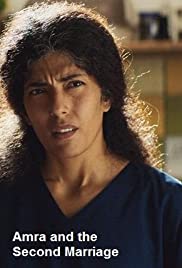
AMRA AND THE SECOND MARRIAGE
Saudi Arabia, 2018, 94 minutes, Colour.
Alshaia'a Tayeb.
Directed by Mahmoud Sannagh.
Cinema became more respectable in the latter part of the 2010s in Saudi Arabia. There had been a few films from that country, Wajda, Barakha meets Barakha (from the same director), which had played in international festivals as did this current film.
The film opens more than a window for non-Saudi audiences to see something of the details of the country, from suburban homes and streets and garages to the huge oil industrial plants.
This is the story of Amra, 25 years married, her husband generally absent but, on returning home, treating her peremptorily, as his chattel more than his wife. They have three daughters – who are generally cantankerous towards their mother, one with a child, the other dating a somewhat hippie boyfriend with his drugs, and a younger girl who has piano ambitions.
Amra has been inculcated with the traditions, embarrassed when caught without the nequib in public, especially with a man. Yet, working diligently at home, a master cook, supplying for functions, cleaning, going to market, the ordinary jobs of the household.
She is also religious, beginning to be worried when she hears rumours that her husband is to take a second wife because he wants a son. And, she is continually criticised by her mother-in-law. However, she does have some friends in the community that many of the women turn against her when she has her troubles and is upset about the second marriage.
She prays, listen to cassettes of the Koran, consults religious leaders who have bogus remedies (and with statements like “women are the fuel in hell�.) She consults a lawyer who has three wives. She also watches videos of feminine speakers from the United States new ways of thinking and behaving.
As the marriage approaches, she becomes more and more resentful, challenging the bride, criticising her husband, setting fire to some of the celebrations – as well as to her mother-in-law.
While there are touches of comedy, more than touches of irony, the screenplay offers critical points about traditions of culture and religion in the Saudi context.
1. A film from Saudi Arabia? Audience awareness of life in Saudi Arabia, the Islamic tradition, customs, the Kingdom, the role of men, the place of women? 21st-century and world culture?
2. The city, the settings, the suburban streets and houses, the cars? The house and the kitchen? The community, close-knit? The vistas of the oil fields and the technology?
3. Amra’s story, her age, married for 25 years, the three daughters? Her status as a woman? Traditions of place, dress, modesty, serving? The effect on her personality? The response of the daughters, the daughter arriving home with the baby, relationships, the daughter out with her boyfriend, more permissive, drugs, wanting to drive the car…? The youngest daughter, at home, school, the piano?
4. Amra, her work and cooking, the dishes for the feast, her being ordered about? Her liking the cooking, cleaning? Her absent husband, the relationship?
5. The news of his taking a second wife, the age of the wife, that he wanted a son? Amra putting on a brave face, but her being upset, resentment? The advice of her friends and confiding in them? The arrival of her mother-in-law, dominant, criticisms, liking the food? Justifying her son?
6. Amra and her life, listening to cassettes of the Koran, taking her daughter to school, asking the neighbour if he would take the daughter, her being caught without the nequib and her modesty? Yet the attraction? Her consulting the religious leaders, the lawyer with his three wives, the bogus leader and his tonics and cures? Looking at the phone with the talks from the woman in New York? Urging change?
7. The ultimate effect on Amra? Her husband’s return, ordering her about like a slave?
8. The building up a presentment, the confrontation with the new wife, the issue of the crews, getting the gas and the fire, the flame and searing her mother-in-law’s face? The fire at the reception?
9. Amra, her place in the community, her future with her husband and daughters, the film as critique of the traditions and the place of women? Wives?